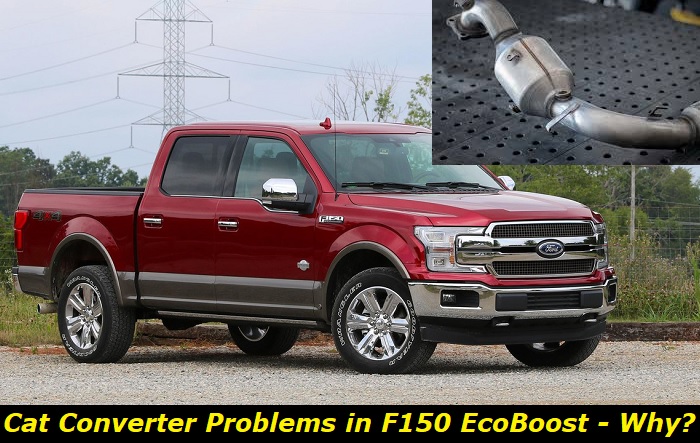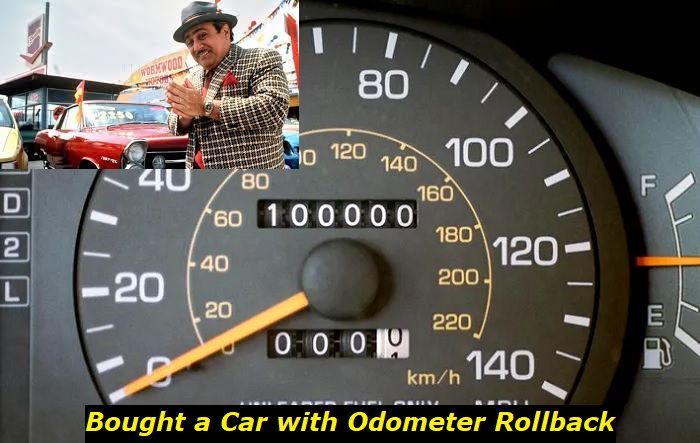Unfortunately, modern cars will not eternally drive without throwing problems. One of the common things for absolutely all vehicles that are now on the roads of the US is that they have catalytic converters in them. And these converters may go bad unexpectedly at almost any mileage. Sometimes, they die naturally, but sometimes we accelerate their deterioration with our driving style and habits.
If your Ford F150 EcoBoost has a catalytic converter problem, you may need to clean or replace the cat converter. Also, there may be an issue with one of the oxygen sensors. It's important to have the vehicle inspected in several shops or dealerships to see the entire problem and make the right decision.

Here's what I will cover in this article:
- How do you know that a catalytic converter requires attention in the F150?
- How long will the F150 EcoBoost converters live?
- Is there any alternative way rather than replace the expensive catalytic converter?
- Can you drive with a bad converter and check engine light in your F150?
- What are your options for catalytic converter replacement in the Ford F150 EcoBoost?
Let's get started!
Signs that the catalytic converter in your Ford F150 is dying
First of all, you need to make sure that the converter is the culprit of your problems. It's not uncommon for other EcoBoost problems to act as converter damage. But I should say that V6 EcoBoost engines (2.7 and 3.5 ones) have common problems with catalytic converters. The problem became noticeable in about 2015 and stayed very common up to 2022.
Actually, if your vehicle throws the P0420 or P0430 code, in most cases, you will need a new converter. And this may happen much earlier than you may expect. I've heard an F150 owner replacing the converter at 8,500 miles! Of course, such replacement will be done under warranty, but still, this is weird.
So, here's what tells you about the converter death in the F150 truck:
- at first, the truck's behavior doesn't change much, so you see no effect on how the vehicle goes on the road;
- but the check engine light will come on and off - one day it's on, then several days it may not bother you;
- the code behind this check engine light is most often P0420 or it may also be P0430 - they basically mean the same;
- fortunately, the ECU will also tell you about the Bank that malfunctions, so it helps you identify the converter in question;
- if you ignore the problem, it will grow into the fatally failed converter, low power, bad acceleration, poor gas mileage;
- eventually, your car will not be able to start and you will have to call a tow truck if the catalytic converter is deadly clogged.
Usually, you would expect the converter in your V6 EcoBoost to go bad at around 150,000 miles. But there was some problem with F150 converters that Ford never acknowledged. It means that if your vehicle is not under warranty when this happens, you will need to pay for catalytic converter replacement.
Unfortunately, this is not a cheap repair even if you go to the independent shop, let alone the Ford dealership. I will try to outline the major takeaways about the cat converter repair in the F150 later in this article.
How long will the F150 EcoBoost converter live?
I've spoken to several owners of F150 trucks with 2.7 and 3.5 engines under the hoods of their vehicles. And you'll be surprised but the majority of them confirmed they had problems with catalytic converters. I don't mean only people that had trucks with 200K miles on them. No, a lot of trucks had only 20-30 thousand miles and their condition was very close to new.
This tells me about the obvious failure of Ford with the choice of converter type for these engines. Both 2.7L and 3.5L EcoBoost engines obviously have faulty catalytic converters. Maybe, it's about their size or the technology used. Or maybe Ford did something wrong when manufacturing them. We will never know this.
Meanwhile, F150 owners massively go to Ford dealerships all around the country and have their converters replaced under warranty after driving their trucks for a year or two. This is the reality we have to put up with.
What do you need to conclude? That's easy: try not to void the warranty of your F150 truck because you will freak out if you have to pay for catalytic converter replacement from your own pocket!
Can you try something else without replacing the converter?
Actually, some Ford owners confirmed that oxygen sensor replacement helped them deal with the P0420 or the P0430 code and this was a long-term solution to the problem. Interestingly, one of the Ford dealership mechanics I've spoken to recently told me that they usually replace the broken converters along with the oxygen sensors.
This makes me think that pretty often the error code is thrown just because of the oxygen sensor failure. And if your truck is not under warranty, it's 100% worth it to first replace the sensor and see if this helps you.
You may ask about catalytic converter cleaning, but there are several downsides to this process:
- first of all, the EcoBoost-powered F150 truck is not old and its converter is not faulty just because it's clogged, there is some other problem;
- secondly, to clean the converter, you will need to take it off the car, and pay for labor, chemicals, and installation, but this may not help at all;
- thirdly, the overall efficiency of converter cleaning is low and you risk just losing this money instead of actually dealing with the problem;
- finally, there aren't a lot of exhaust shops that will at all take your F150 for converter cleaning.
I would say this is not an option when it comes to F150 converters, especially with EcoBoost engines. There is surely a technical problem with these catalytic converters and you need to solve it, not just postpone the problem for 100-200 miles.
So, with your truck, there are basically no other ways of dealing with the problem than trying to replace the oxygen sensor and then, if this doesn't help, replacing the catalytic converter that is throwing the code. If this happens to you at low mileage, you may be sure that the second converter is also going to fail soon.
Can you drive with a bad converter and a code in the ECU?
If your F150 has a bad catalytic converter but low mileage, you are unlikely to feel that in your driving. The truck will still have power and will accelerate as it usually does. But the check engine light will illuminate from time to time. This is the only change you will notice, at least for now.
So, yes, you can drive even though the converter is no longer filtering the exhaust gases of your truck as it should and the emissions rate is changed. But you can drive such a truck up until the next fog test. The truck will not pass the emission test in any state if it has an active error code connected with the converter and the culprit is actually a bad catalytic converter.
So, this problem doesn't require an urgent solution. But I wouldn't recommend you ignore it.
What are your options for catalytic converter replacement in the F150?
The F150 truck with the EcoBoost V6 engine has two catalytic converters - one unit in each engine bank. The replacement is not that hard but it will require some specific work to be done because the bolts that fasten the converter's exhaust pipe section are usually stuck and need a professional approach to be unscrewed.
One of the problems is that the converter itself costs a lot. I've been told in one of the Ford dealerships that a non-warranty converter replacement will cost an F150 owner about $6000 to $7000 for one catalytic converter. This is just insane and I don't think you will want to spend that money!
I also asked several exhaust shops and they all told me that the average price will be about $1,600 for each catalytic converter but the unit will not be OEM. When you are installing a non-OEM converter, you should understand that its average lifespan is no more than 30K miles.
You may think that a used converter is a good option but given these EcoBoost catalytic converters are faulty, I wouldn't buy a used one from a scrapyard. You risk getting a bad unit for several hundred dollars.
So, there is no optimal solution and any kind of repair will cost you quite a lot of money. But ignoring the problem is not a good option either, so you will anyway have to make a certain decision.
Final thoughts
When you are buying a Ford truck, you expect it to be durable and immortal. But modern cars get great technologies for performance and eco-friendly driving. And this makes them less reliable. Ford F150 EcoBoost engines are not an exception to this rule. Their new highly efficient converters tend to fall apart at low mileage and cause a lot of problems and expenses.
Fortunately, in the majority of F150 trucks, you will get this problem before the warranty period is over. Also, Ford changed the converters for the 2.7 and 3.5 EcoBoost engines and now offers updated parts that should be much more durable. So, have it replaced under warranty as soon as possible. If there is no warranty, you will have to pay quite a lot for this repair, whatever option you choose.
If you have experience with F150 converter problems, share with us in the comments below!
About the authors
The CarAraC research team is composed of seasoned auto mechanics and automotive industry professionals, including individuals with advanced degrees and certifications in their field. Our team members boast prestigious credentials, reflecting their extensive knowledge and skills. These qualifications include: IMI: Institute of the Motor Industry, ASE-Certified Master Automobile Technicians; Coventry University, Graduate of MA in Automotive Journalism; Politecnico di Torino, Italy, MS Automotive Engineering; Ss. Cyril and Methodius University in Skopje, Mechanical University in Skopje; TOC Automotive College; DHA Suffa University, Department of Mechanical Engineering






Add comment